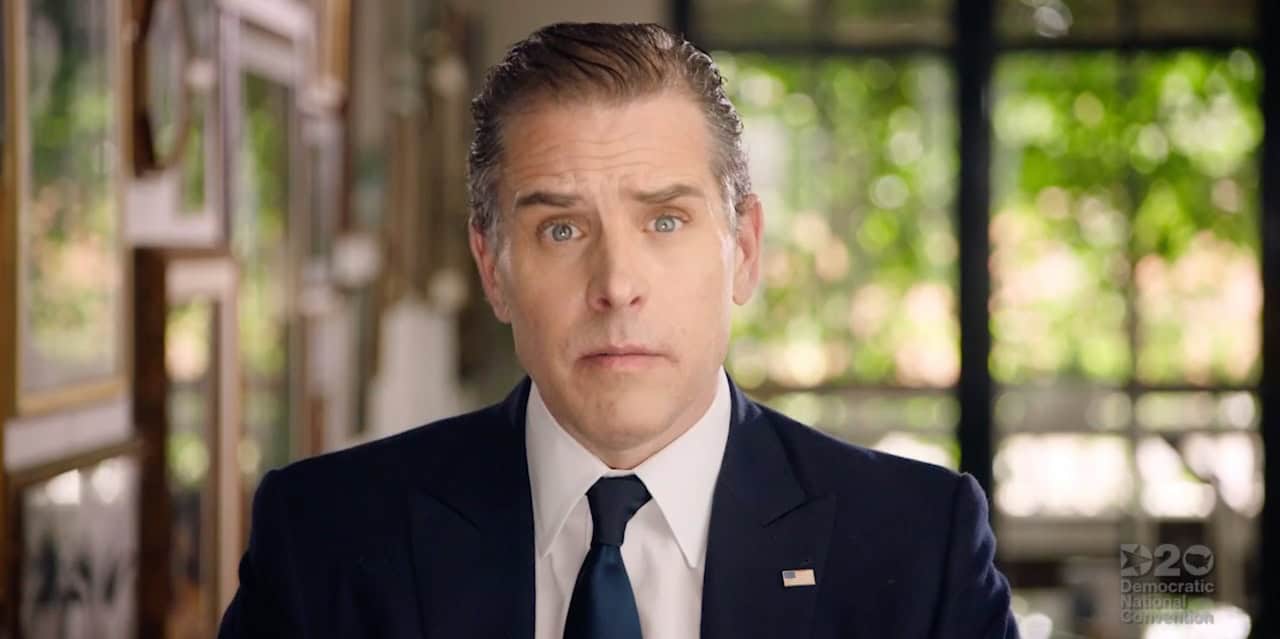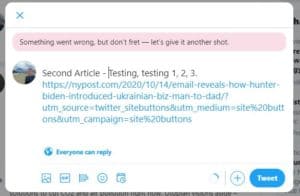Facebook and Twitter Censor Report on Hunter Biden Introducing Joe Biden to Ukrainian Businessman

Facebook and Twitter are censoring and reducing the distribution of a New York Post article that highlights how Hunter Biden allegedly introduced his father, Joe Biden, to a Ukrainian foreign businessman while he was on the board of the company.
The New York Post published two articles Wednesday morning that claimed to reveal that Hunter Biden introduced his father, then-Vice President Joe Biden, “to a top executive at a Ukrainian energy firm less than a year before the elder Biden pressured government officials in Ukraine into firing a prosecutor who was investigating the company.”
“The never-before-revealed meeting is mentioned in a message of appreciation that Vadym Pozharskyi, an adviser to the board of Burisma, allegedly sent Hunter Biden on April 17, 2015, about a year after Hunter joined the Burisma board at a reported salary of up to $50,000 a month,” The Post wrote.
The email obtained by The Post reveals the Ukrainian businessman wrote to Hunter, “Thank you for inviting me to DC and giving an opportunity to meet your father… It’s realty an honor and pleasure.”
Another email dated May 12, 2014, shortly after Hunter Biden joined the Burisma bord, shows Pozharskyi asking Hunter to “use your influence… to stop what we consider to be politically motivated actions.”
According to The Post, “Less than eight months after Pozharskyi thanked Hunter Biden for the introduction to his dad, the then-vice president admittedly pressured Ukrainian President Petro Poroshenko and Prime Minister Arseniy Yatsenyuk into getting rid of Prosecutor General Viktor Shokin by threatening to withhold a $1 billion US loan guarantee during a December 2015 trip to Kiev.”
After the publications of the two articles, Andy Stone, the Policy Communications Manager at Facebook, tweeted that his company was reducing the reach of The Post’s article on its platform.
“While I will intentionally not link to the New York Post, I want be clear that this story is eligible to be fact checked by Facebook’s third-party fact checking partners. In the meantime, we are reducing its distribution on our platform,” Stone wrote.
Intriguingly, on his Twitter biography, Stone identifies as an alum of the House Majority PAC (a super PAC that works to “defend and expand the Democratic House majority”), and an alum of former California Democrat Senator Barbara Boxer, the Democrat Congressional Campaign Committee and California Democrat Rep. Jerry McNerney.
In a subsequent tweet, Stone defended his original post writing that the reduced distribution is a “part of our standard process to reduce the spread of misinformation.”
Sen. Josh Hawley, R-Mo., is demanding answers from Facebook.
In a letter to Facebook, Sen. Hawley wrote, “The New York Post released a story revealing that Hunter Biden facilitated a meeting with a Ukrainian energy executive and his father, who was then serving as vice president… evidence that directly contradicts the claims [of Joe Biden] who had previously stated that he has ‘never spoken to my son about his overseas business dealings.’”
Sen. Hawley then asked Facebook five questions, including whether it is its “normal policy to reduce the distribution of stories on your platform before they have been fact-checked?”
Later in the day, Twitter joined in censoring the article.
Twitter was not allowing individuals to share either of The Post’s articles on its platform.
Sohrab Ahmari, an editor at The New York Post, attempted to share the article on Twitter, but wasn’t allowed to. Following his attempted posting, a message from Twitter popped up which said, “Your Tweet couldn’t be sent because this link has been identified by Twitter or our partners as being potentially harmful.”
“This is a Big Tech information coup. This is digital civil war,” Ahmari wrote.
The author of this article confirmed Twitter’s censorship by attempting to tweet The Post’s story from his personal Twitter account and was unable to do so.


Additionally, Twitter has allegedly locked The Post’s Twitter account “because the Hunter Biden stories violate its rules against ‘distribution of hacked material,” said New York Post business reporter Noah Manskar.
“This is amazing. Now @Twitter joins @Facebook in censoring the @nypost reporting on Biden,” Sen. Hawley tweeted on Wednesday afternoon. “You almost get the idea #bigtech wants to buy this election.”
Sen. Hawley subsequently sent a similar letter to Twitter, asking among other questions, “Why did Twitter take additional, unprecedented action to lock the primary Twitter account of the New York Post, one of the nation’s most widely distributed newspapers?”
Additionally, Sen. Hawley wrote a letter to the Federal Election Commission (FEC) asking them to look into whether Facebook and Twitter’s censorship “constitutes a clear violation of federal campaign-finance law.” Though federal law prohibits “any corporation from making a contribution to a federal candidate,” the censorship “appears to constitute contributions under federal law.”
Sen. Ted Cruz, R-Texas, has also written a letter to Twitter regarding its censorship of The Post’s story.
Sen. Tom Cotton, R-Ark., tweeted a warning to Facebook and Twitter.
“Big Tech has spoken. You will see and read only what it finds politically acceptable. Twitter, Facebook, and all the rest of you: If you want to act like publishers, we will treat you like publishers,” Sen. Cotton wrote.
Joe Biden’s presidential campaign has denied the allegations arising from The Post’s article as “not legitimate.”
“Joe Biden carried out official U.S. policy toward Ukraine and engaged in no wrongdoing. Trump Administration officials have attested to these facts under oath. The New York Post never asked the Biden campaign about the critical elements of this story… we reviewed Joe Biden’s official schedules from the time and no meeting, as alleged by The New York Post, ever took place,” said Joe Biden’s Spokesman Andrew Bates.
The New York Post Editorial Board wrote an editorial in The Post later in the day accusing Facebook and twitter of helping Joe Biden’s presidential campaign:
“An executive of one of the most powerful media platforms in the country, who brags about his years working as a partisan Democratic operative, publicly boasting of his attempt to keep Americans from learning something embarrassing about the Democratic presidential candidate. And then a major competitor rushes to completely suppress the same story. Facebook and Twitter are not media platforms. They’re propaganda machines.”
You can follow this author on Twitter @MettlerZachary
Photo is from Reuters.
ABOUT THE AUTHOR
Zachary Mettler is a writer/analyst for the Daily Citizen at Focus on the Family. In his role, he writes about current political issues, U.S. history, political philosophy, and culture. Mettler earned his Bachelor’s degree from William Jessup University and is an alumnus of the Young Leaders Program at The Heritage Foundation. In addition to the Daily Citizen, his written pieces have appeared in the Daily Wire, the Washington Times, the Washington Examiner, Newsweek, Townhall, the Daily Signal, the Christian Post, Charisma News and other outlets.




